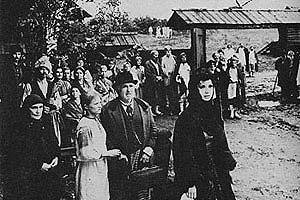

PART THREE

Analysis
Alyosha had been preparing for this event throughout his rearing, but it
appears he was not ready. It appears that he was expecting a miracle to
occur like all of the others. Belief, without divine intervention, parallels
Ivan´s Grand Inquisitor tale. Alyosha, unlike his brother, Ivan, does
not question God's existence. Instead, he questions His justice. "I
am not rebelling against my God; I simply don't accept His world."
III.-IV. An onion/Cana of Galilee
Summary
Grushenka is surprised to see Rakitin and Alyosha. She says she has been
awaiting a message from a Polish ex-lover who may be sending for her. Grushenka
approaches Alyosha and sits on his knee. When she discovers why Alyosha
is so down, her mood quickly changes. She denounces her life of sin. Alyosha
listens as Grushenka recounts a story of an sinner whose only act of kindness,
the gift of an onion to a beggar, resulted in her eternal damnation when
she refuses to allow other sinners to use it to climb up to heaven. Afterwards,
a message arrives from her lover, and she leaves. She tells Alyosha to tell
Dmitri that she loved him "only one short hour." Alyosha returns
to the monastery and goes to the elder's cell. While Father Païssy
reads the wedding of Galilee
, Alyosha dreams that he and Father Zosima are at the wedding, too. Zosima
tells Alyosha to rejoice and enjoy life. It is time to "sojourn in
the world."
Analysis
Through this peculiar encounter with Grushenka, Alyosha has a transformation.
His "loving heart" will not be left in a monastery, for "he
who loves men loves their happiness." This interaction with Grushenka
shows the value of what Zosima has preached: Christ came to give people
pleasure in the world and to preach love and joy. This more than anything
is grounds for believing.

Summary
Dmitri hopes that Grushenka would accept him as her husband. His still has
to resolve, however, the financial and moral debt he owes to Katerina. He
tries several ploys to attain the 3,000 roubles. First of all, he offers
his claim to some of Fyodor's property to Grushenka´s protector, Samsonov.
After he gets sent on a wild goose chase to some peasant merchant and is
told to head to the "gold mines" by Madame Khokhlakov, he finds
himself searching for Grushenka, herself. Not encountering her at home,
he heads to his father's. Dmitri does not find her with his father, though
he does find trouble. While trying to flee, he is forced to knocks out Grigory
with a pestle. When he returns to Grushenka's house, he discovers the real
reason she is gone. Recovering his pistols from his friend Perkhotin, he
goes to a nearby store and buys hundreds of roubles of food and wine. He
must see Grushenka one more time at Mokroye. He finds her with the Poles.
After Dmitri displays what a despicable character Vrublevsky really is,
Grushenka turns to Dmitri. They fall asleep together only to be awoken by
the police captain, Mikhail Makarovich. He is being charged with the theft
of 3,000 roubles and his father's murder!
Analysis
The plot thickens as thought moves to action. Throughout this entire passage,
the first-time reader is convinced of Dmitri's culpability. It appears that
he has few qualms with doing what is necessary to acquire the money. Of
course, the resolution to commit suicide after his final night with Grushenka
assures the reader of his desperation. In this desperation, he also begs
for the forgiveness of his sins. By calling to his God, Dmitri proves Zosima's
point: those who sin can still love God. This deep love for God and Dmitri's
willingness to seek forgiveness will strengthen in his attempt at redemption.
Here are web sites for some of the subjects
mentioned in the book:
BOOK NINE - The Preliminary Investigation
Summary
Perkhotin attempts to make sense out of the previous evening's events. Unfortunately,
the information he gathers suggests Dmitri's culpability. The authorities
decided to apprehend Dmitri. While he is proclaiming his innocence, Grushenka
bursts in and says that she drove him to parricide. Upon cross-examination
by Nikolai Parfenovich, Dmitri explains all of the events of the previous
night except how he attained the money. When they strip-search him and discover
addition blood spots, he decides that perhaps he should explain. He tells
them that the sum of money in his possession is left over from the initial
sum from Katerina Ivanova. He had been wearing it around his neck to remind
him of his shame. Since he was going to commit suicide, he might as well
use it. While Nikolai cross-examines Grushenka and the others, Dmitri dreams
of shedding tears for an abandoned baby. The authorities decide to take
him into custody. Before leaving, he embraces Grushenka and asks her forgiveness.
Analysis
The author has conveniently put Dmitri into a situation where his culpability
seems an undisputed fact. Of course, the investigators' survey of his life
parallels his own. He realizes that he is not guilty of his father's murder,
but for his past sins. That is why he is prepared to repent and face the
consequences. He does not wish to "die a scoundrel." His dream
of the peasant woman's babe symbolizes his acceptance of purification through
suffering. Grushenka mimics Zosima's teaching in trying to take responsibility
for Dmitri's actions. She tries to be her "brother's keeper".
Here are web sites for some of the subjects
mentioned in the book: